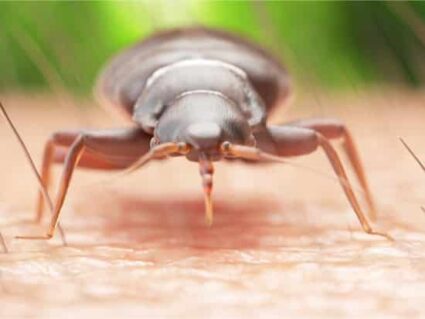Bed bugs are one of the most difficult pests to eliminate. Once they’re gone, they can come back at any time. Any new mark or itch can leave you wondering whether the bugs are back.
If you’re still itching, then bed bugs may have returned. Treatments often miss eggs, and new bugs can always find their way in. But even if the bed bugs are gone, bites may still itch for months afterward. You may also be experiencing psychosomatic itching due to anxiety.
This article will help you to recognize the signs of a bed bug re-infestation, and how to treat persistently itchy bites. We’ll also explore the psychological repercussions of bed bug infestations, and how you can help to prevent bed bugs from returning.
How Do You Know When Bed Bugs Are Gone?
If you’re still itching after having your home treated for bed bugs, the first step is to make sure that the bed bugs are gone.
Even exterminators aren’t perfect – bed bugs are notorious for returning even after professional treatment. Their eggs are tiny, and easily hidden in cracks and crevices. If even one or two eggs remain after treatment, they’ll soon hatch and multiply.
So, keep your eyes peeled for the signs of reinfestation. As well as fresh bite marks, you might notice:
- Bed bug feces. This will appear as small dark brown or black dots that look like ink.
- Small reddish-brown stains on your mattress, caused by the bed bugs feeding or being crushed and leaving drops of blood.
- Bed bug casings. These are the shed shells of bed bugs. They look similar to the adult bugs, but are slightly smaller and pale cream to brown in color.
- Live bed bugs. Bed bugs typically come out during the night, so wait until it has been dark for a few hours and then switch the light on to spot them.
Be sure to search your whole home, focusing on the bedroom. Inspect anywhere that bed bugs might live, including the mattress, box spring, carpet, curtains, and walls. Bed bugs can slip into tiny cracks, so you might also check inside cracks and crevices in furniture.
Getting a Professional Assessment
If you suspect that your bed bugs have returned, or you aren’t sure, it’s worth getting the opinion of a professional. Ask an exterminator who is experienced in dealing with bed bugs to come and perform an assessment on your home.
They may use a variety of techniques, such as bed bug sniffing dogs, to diagnose an infestation. You’ll have to pay for the assessment, but it’s worth it for peace of mind.
No More Bed Bugs but Still Itching: What Now?
Bed bugs gone but still itching? If you can find no signs of a reinfestation, and the exterminator has given your home the all-clear, it’s probably safe to assume that the bugs really have gone.
So, if that’s the case, why can you still feel itching or creeping-crawling sensations on your skin? There are four potential reasons. Let’s look into each one now.

How Long Do Bed Bug Bites Itch?
If you’ve had bed bugs, one thing is for certain: you will have been bitten at some point. However, bed bug bites can produce very different reactions in different people.
Some people may suffer from a small red bump for only a few days. Others may continue to itch for weeks or months after a bed bug bite. Certain individuals do not experience a reaction at all.
If you’re particularly sensitive to bed bug bites, you may find that your bites continue to itch long after the infestation has gone.
Bear in mind, also, that it may take up to 14 days for your skin to develop a reaction after being bitten. So, if you discover another welt on your skin after the exterminator has visited, don’t panic. It may just be a delayed reaction.
Lingering Histamine
Bed bug feces contain high levels of histamine, a natural chemical that can produce allergic reactions in humans. A recent study by North Carolina State University found histamine levels to be 20 times higher in bed bug-infested homes than in homes free from bed bugs.
The researchers also found that residual histamine in the home can persist for up to three months after an infestation is dealt with. Unlike the bed bugs themselves, histamine doesn’t disappear with heat treatment.
So, even if all bites have healed, the lingering histamine on your bedsheets, furniture, and clothing may continue to make you itch. Deep-cleaning your home may help.
Phantom Bed Bug Bites
If lingering histamine or leftover bites isn’t the reason for the problem, then perhaps the itching is psychosomatic. In other words, it’s all in your mind. There could be nothing triggering your itching except anxiety and paranoia.
You’ve most likely spent the last several weeks, months or even years waging a fierce battle against bed bugs. You’re probably on high alert, wondering if every little sensation or spot could be a sign of reinfestation.
According to Clinics in Dermatology, experiencing stress can trigger your body to release histamine, causing itching. This itching may, in turn, make you even more anxious – leading to a vicious cycle.
Other Causes of Itching
Finally, there could be another cause of your itching altogether. Bed bugs might not be your problem anymore, but there are many other potential causes of itching.
You could, for example, have an allergic reaction to a new brand of laundry detergent or soap. You may be suffering from eczema or psoriasis. Or, you might have contracted another infestation, such as lice or scabies. If you’re worried, it’s never a bad idea to visit a dermatologist for advice.
How to Treat Bed Bug Bites
While your remaining bed bug bites are healing, they’ll probably continue to itch for quite some time. However, there are steps you can take to relieve the itching, and help the bites heal faster.
- Always keep the bitten area of skin clean and dry. Wash with a mild soap, and try not to use water which is too hot, as this can aggravate the itching. Pat dry, don’t rub.
- Try not to scratch your bites too much. As tempting as this is, excessive scratching could cause the bites to become infected.
- Apply aloe vera, witch hazel, or calamine lotion to the bite marks. These cooling topical ointments help to reduce itching and moisturize your skin. They’re available at most drug stores.
- If the itching is severe, antihistamine tablets can also help to reduce itching. The antihistamine works by reducing the severity of your body’s reaction to the bites.
- Finally, if the bites are painful as well as itchy, try taking a pain relief medication such as Advil.
Eventually, your bites will heal and your skin will return to normal. You shouldn’t have to wait longer than a few weeks. If you’re still experiencing fresh bites after three weeks, you may need to consider that the bed bugs have returned.
What Are the Chances of Bed Bugs Coming Back?
Unfortunately, getting rid of a bed bug infestation is no guarantee that they will remain out of your home forever, even if you use a professional exterminator.
Professional heat treatment will kill all remaining eggs, but a brand new infestation could be introduced. You may pick up new bed bugs from a hotel, a friend’s home, or even from public transport.
To help reduce the chances of a reinfestation, follow these guidelines.
- Where possible, stand up on public transport rather than sitting down.
- If you know of any friends or family members that have an infestation, avoid visiting their homes. If you do, thoroughly check your clothes before you re-enter your own.
- When staying in a hotel, never place your luggage down on the bed, carpet or luggage rack. These are all prime bed bug hideouts. Instead, place your suitcase and coat in the bathtub. The bathroom is the least likely place for bed bugs to live. Thoroughly inspect the room before deciding to stay. If you find any signs of bed bugs, leave the hotel and stay somewhere else.
- At home, keep your mattress in a bed bug proof encasement. Every so often, wash all of your bedding at 140 degrees Fahrenheit, just in case.
- Place bed bug interceptor traps under the legs of your bed. That way, if any new bed bugs arrive, you’ll be able to spot the infestation before it gets out of hand.
If you do notice any new signs of bed bugs in your home, call an exterminator straight away. The sooner you tackle the problem, the easier it will be to solve.

